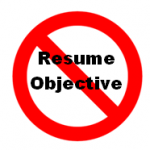What is the point of a resume? It is an ad, designed to get an employer interested in you.
So why do so many people start out with a statement of what they want: “where I can contribute my skills to a growing blah, blah, blah…” Most objectives are boringly similar and none really attract the ‘buyer’, the employer you seek. Skip them!
How do you grab an employer’s attention positively
Start your resume with a Summary that talks about what you can do for the employer immediately. This is one short paragraph or 3-5 bullet points which highlight how your past successes provide immediate value to meet the employer’s needs. It is designed to get interest, to encourage the target to read the resume. If you are in a technical field, you might add 5-8 specific technologies or methodologies in columns under your paragraph.
Other smart items to highlight in your summary are:
- Your security clearance, if you are applying for government contracting positions. TS/SCI is fine, no need to detail the granting authority and such at this stage.
- Relevant certifications, such as PE or PMP.
What should you skip?
- Meaningless lists of skills. Don’t just say ‘communications skills’ or ‘good teamworker’. Do say ‘selected for multinational training team’ or ‘recognized for teamwork on numerous projects’.
- Multiple career interests and experience. Don’t say ‘experienced human resources, marketing, event planner, and operations manager’. Separate by career group into different resumes if you are applying for jobs in several fields.
- Years of experience. Years do not tell anything about quality. And they can get you ignored as too experienced or too old for the job.
Your summary statement should show the most relevant aspects of your experience and skills as they relate to the jobs you seek. And each statement in it needs to be supported within the resume. Some examples to get you thinking about your summary:
- Focused manager, with PMP, known for leadership and productive partnerships with clients.
- Experience in IT project management, web development and business analysis, including: PMLC, SDLC, RUP, PMI, CMM and Six Sigma.
- Highly rated instructor in technical and soft-skill courses, both in-person and via webinar.
- Recognized for depth and breadth of research supporting national level intelligence assessments.
When you are creating your summary, you need a master one that is really targeted to the specific work you want. But when you apply to a specific employer, be sure you check your wording against the words they use in the job ad, in job postings on their website, and in how they talk about themselves. Then tailor your words according to theirs and to the specific job.
Other resume start tips
Don’t waste space with fancy formatting or extra identifying information. Formatting tends to mess up in many corporate application systems and hinders your chances. More information about you can add to identity theft potential, as any resume you transmit electronically can be sent elsewhere.
Start with your name, one telephone/cell-phone number and one email address you want to use for your job-hunt. You can add, but do not need to, a physical address.
Have one resume you use for networking and sharing with those connections who might be able to help you find work. For this one, consider adding a targeted headline above your summary. This makes it easier for the people who have it to remember what work you seek and thus to help you more easily. Try something like this:
TOP FEDERAL AND STATE TRANSPORTATION BUSINESS DEVELOPER
Remember that your resume is an ad and you need to capture attention quickly. How many ads do you ignore? Don’t let your resume suffer that fate. Give the targeted employer reasons to contact you. Tailor your resume to demonstrate your value to a potential employer and you will improve your job search success.
Originally published in ClearedJobs.net





